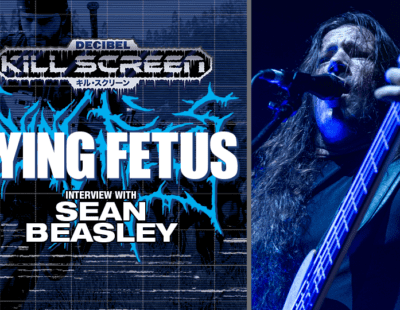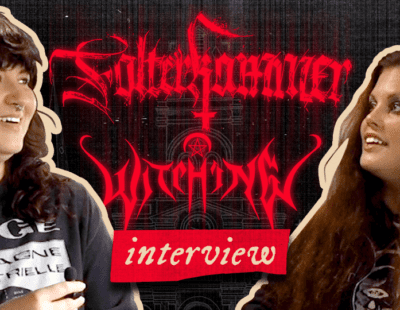
Atlanta metalcore band Norma Jean have always been a cut above their peers, adding in elements of noise rock and melodic alternative metal in a way that, amazingly, doesn’t suck. It actually rules, and they’re rulin’ it hard once again on seventh album Polar Similar. We caught up with vocalist Cory Putman to talk about what’s new on the album, the reality of changing members, and just how the fuck a Christian gets away with swearing on a record.
What do you think is different about this album?
The overall theme and the idea of just having a theme was a new, different direction for us. And the way we wrote it was intentionally knowing what song was going to be first from the very beginning and purposefully writing it for that reason, and knowing what song was going to be last from pretty close to the beginning. So just really shooting for that was a different thing that we’d never explored before.
Tell me a bit more about the conceptual theme. What is it?
“Polar similar,” really, is what it is. You hear “polar opposites,” but I think the more truer form of that is actually polar similar, which I guess is something we made up. I was thinking about polar opposites, especially in the social climate the world is in today, where everyone’s pointing fingers and nobody’s getting along, I was trying to think of something that related to that in a broader sense. This polar opposites idea, when I see it, I imagine two poles, and I thought maybe those poles meet in the middle somewhere, in an unseen place we can’t see. I just like that idea.
I like the song title “Everyone Talking over Everyone Else.” What is that one all about?
I’m stoked you brought that up, because that song title is definitely a tribute to Lemmy [the phrase “Everything Louder than Everything Else”] and I want everyone to know that. But that song is a very personal song to me; a lot of the songs are about different kinds of abuse from different perspectives. That’s a very central song to my experience of being in an abusive relationship when I was younger. Being very detached from it now, I wanted to talk about it in a very forward way, which was something I’d never done before. The main theme is not knowing that you’re in that type of relationship. We’ve heard lots of women say that before; not many men, but it does happen. So that’s what it’s about: realizing you’re in that situation, and wanting to get out of it, and once you are you look back and say, “Whoa, what was I doing in that for so long?”

How did it feel to get that out?
Awesome. It was great. I’ve always thought of music as being very cathartic. It’s definitely cathartic getting into those old places, and knowing that hopefully somebody else could get something out of it, that’s cool to me too.
You’ve got a new guitarist this time around [Phillip Farris]. How’s that working out?
Great. It’s one of those things where I want to say, “Yeah, it’s the best ever,” but I also want to be super honest about it. Every band wants to say all the good things that have happened to them, but truth is when you lose a member it’s not easy and you lose a connection to a person and a chemistry, especially when it comes to writing, so you do have to build that up again, but there is a cool thing with that where that person comes in and brings new things to the table that you never would have thought of, and as long as you’ve got the right guy, you’re in good hands.
Tell me about the cover art. It took me forever to realize what I was looking at.
My wife actually found this book archive and I just dug through that until I found that image. It’s rats from an old lab book from the late 1890s. I just turned one of them red and that’s the cover.
I actually thought it was a picture of trees for about a week. Then I was like, “Oh, shit. That’s not trees.”
I think that’s cool (laughs). Either way, it’s four things and they’re all kinda different colors. I think there’s something to take out of that that people can interpret however they want.
On the album there’s a few new sounds, like “Nebula,” which is blues guitar for three minutes. Where did that come from?
That’s our new guitar player. The guy was literally—and he’ll tell you this—he kinda raised himself in the woods in Louisiana. He had a pretty rough childhood. He was raised on blues and bluegrass and country. That’s kind of where his roots lie. Later in life he would find metal and… Pantera (laughs).
What else do you think might surprise Norma Jean fans on the album?
My favorite thing is where we recorded, Pachyderm Studios. Before we went there the only thing I really knew about it was that Nirvana did In Utero there and Failure recorded Comfort there, so we knew it was cool and it was going to be fun to record there. But we didn’t really know what we were getting ourselves into. It’s in the middle of nowhere—this is January in Minneapolis, there’s snow, we’re in the woods, it kind of had this Shining feel to it. The house is old, from the ’60s, it’s been remodelled but still has all this ’60s decorative stuff in it. It has this old, crazy, kinda creepy feeling to it, but it has a working heated indoor pool surrounded by windows, looking out into the snow. It’s insane; it’s surreal being there. But that room is very echo-y, and the whole house has this creepy echo-y feeling. So we ended up using the house a lot to record. All the reverb-y kinda guitars, all the echo-y sounding stuff on the record comes from us tracking inside the house instead of the studio. So that’s probably my favorite thing because the guys would get up super early, and they would set up guitars and just blast them through the house, and I loved waking up to that.
You’re back on Solid State after a couple albums away from them. That reminded me of the whole Christian-metal thing that you have been very closely tied to. But it strikes me that that was once a big deal but cut to album four or five and it seemed like everyone was over it. How much does it tie into your band these days?
I think the history of it is cool, because I remember when it first started happening, I wasn’t a Christian, but I thought it was cool that there was this new element to music, and I always saw it as, well, this is just another group of bands singing about what they believe in, just like every band does. I never really saw it as this separatist kind of thing. But I think what more or less has happened is that it became more integrated into the heavy-music scene… for the most part. We’ve been on tour with bands that were Christian, and some that were very, very against it. And everyone got along, and the music still had this bond. Everyone still heard the music the same, and that’s the coolest thing to me. I always say music can’t have a belief; it’s a sound. A sound can’t have a belief. But I still sing from a place where my faith comes into play, but, really, I’ve always written about more personal experiences.
The very first lyric on the album, and I’m paraphrasing here, but it’s something to the effect of “You’re going to burn.” I thought, Ooh, I bet some serious Christian fans cringe a bit at lyrics like that.
Um, yeah.
Or maybe they’re right into it. Either way.
I also say “fuck” on the record.
Ouch.
The thing is, I’m 40 years old, I’m allowed to say “fuck.” Like, my kids are 22. But, yeah, that song was a good starter, and I wanted that lyric to be powerful. I do believe there are people in the world that, on a very big level—a huge, global scale—would love nothing more than to watch the world burn and rule the ashes, and just be the king of nothing, because they’re that careless and evil. So that’s where that comes from.





